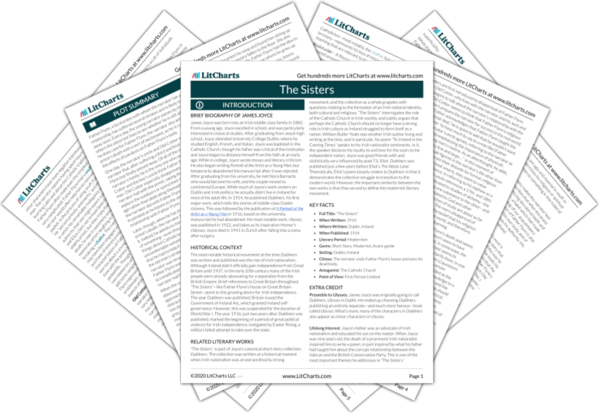The Utility of Education
In James Joyce’s “The Sisters,” the narrator is a young man dealing with his complex emotional response to the death of Father Flynn, a local priest, who served as a mentor to him. While the narrator seems to have, for the most part, admired and enjoyed the company of Father Flynn, other members of the community didn’t seem to have had the same respect for the elderly priest. The narrator’s family members disapprove of…
read analysis of The Utility of EducationAuthority and Corruption
In “The Sisters,” James Joyce follows the young unnamed narrator and his community as they deal with the death of Father Flynn, a local priest. However, the local people have mixed feelings about the priest’s passing: he was a divisive figure in the community, largely because many characters no longer see value or even integrity in the Catholic Church. While on the one hand the narrator admired Father Flynn, he also felt uncomfortable around…
read analysis of Authority and CorruptionDeath, Grief, and Mourning
“The Sisters” is the portrait of a young man and his community as they navigate the death of Father Flynn, a local priest who was admired by some and distrusted by others. And because Father Flynn was such a polarizing figure, people respond to his death in a whole host of ways. All of those who mourn the priest equally struggle with feelings of relief, disgust, and other emotional responses to death that are…
read analysis of Death, Grief, and Mourning
Paralysis, Deterioration, and the Obsolete
While the narrator and other characters are genuinely upset at Father Flynn’s passing, in some ways, they are also relieved. This is because the elderly Father Flynn is characterized as a relic from the past, whose influence on young people and religious teachings are no longer relevant. The death of the priest, then in some ways represents the death of the brand of Catholicism that he espoused. James Joyce himself was a lifelong critic…
read analysis of Paralysis, Deterioration, and the Obsolete






